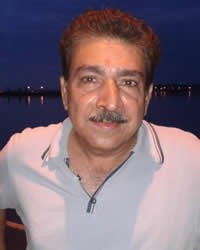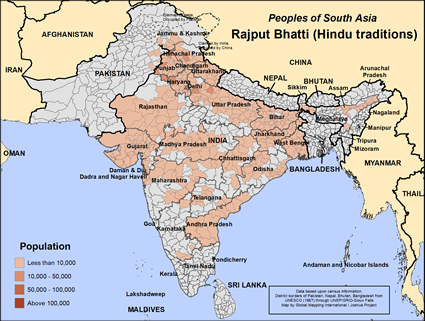Rajput Bhatti (Hindu traditions) in India

Photo Source:
Akhtar Mehmood
|

Map Source:
People Group data: Omid. Map geography: UNESCO / GMI. Map Design: Joshua Project.
|
| People Name: | Rajput Bhatti (Hindu traditions) |
| Country: | India |
| 10/40 Window: | Yes |
| Population: | 899,000 |
| World Population: | 899,000 |
| Primary Language: | Hindi |
| Primary Religion: | Hinduism |
| Christian Adherents: | 0.00 % |
| Evangelicals: | 0.00 % |
| Scripture: | Complete Bible |
| Ministry Resources: | Yes |
| Jesus Film: | Yes |
| Audio Recordings: | Yes |
| People Cluster: | South Asia Forward Caste - Rajput |
| Affinity Bloc: | South Asian Peoples |
| Progress Level: |
|
Introduction / History
The Rajput Bhatti Hindus live primarily in northern India. They claim to be descendants of Yadu, the founder of the Yadava dynasty who ruled a kingdom for five hundred years in central India. The Bhatti are proud of the their military traditions. They often served as feudal lords and ruled over land areas under a ruling prince. The Rajput Bhatti are also known for building Hindu temples and large mansions that tourists can see today. The Bhatti consider themselves to be Kshatriyas, the second highest Varna or caste in Hinduism.
Indian independence from Britain in 1947 brought major changes to the Bhatti. Many still serve as officers and soldiers in the Indian Army. Many others have gone into occupations in administration, science, medicine, government, journalism, banking and trade. Today many Bhatti still own land and work as farmers and employ other lower castes as laborers.
The primary language of the Rajput Bhatti is Hindi. Since they value and obtain a higher education, most speak English as well. They also speak other regional languages of India.
Where Are they Located?
The Rajput Bhatti live throughout the nation of India. They are concentrated in the Indian states of Haryana, Uttar Pradesh, Bihar, Punjab, and Himachal Pradesh and in the capital territory of Delhi.
What Are Their Lives Like?
The Rajput Bhatti live diverse lives in modern India. Some live in cities and enjoy the conveniences of modern life while others still live in rural villages. The urban dwellers encourage their children to get university degrees and to enter professional careers.
Wheat is the main crop of Bhatti farmers. It is their main source of food along with seasonal fruits and vegetables. They also raise animals or meat and dairy products. Some Bhatti are vegetarians and others eat meat except for beef.
The Rajput Bhatti are endogamous, that is they marry within their group. Families arrange marriages within the consent of the young people. Unfortunately, rural Bhatti girls are frequently married off when they are young. Sons inherit the father's property with the eldest son receiving the parents' home.
What Are Their Beliefs?
The Rajput Bhatti are some of India's most devout Hindus. Hinduism is the complex, ancient religion and culture of India. The one reality, Brahman, is worshipped and served in millions of different forms. The goal of Hinduism is release from the infinite cycle or being born and reborn, samsara. One gains this relief or Moksha through performing rituals and good deeds. Bhatti pay special attention to Ganesha, the god who removes obstacles and patron god of arts and sciences.
The Rajput Bhatti participate in the yearly Hindu festivals of Holi, the festival of colors, Diwali, the festival of lights and Navratri, the nine-day celebration in autumn.
What Are Their Needs?
The Rajput Bhatti are going through an identity crisis. They can no longer depend on land ownership or military careers, especially with the Indian government reserving prestigious jobs for "backward" (i.e., underprivileged) castes. Christians with the right skills can help them during this time of transition. Most of all, the Bhatti need to hear the gospel of Christ in a way they can understand.
Prayer Points
Pray for the Rajput Bhatti to increasingly grow in awareness of Jesus, his life and his sacrifice for them.
Pray the Lord will give them a spiritual hunger, and then satisfy that hunger.
Pray that these people will understand the value of becoming part of God's royal family.
Pray for a Holy Spirit led humility for all Rajput communities to fall at the feet of the King of kings.